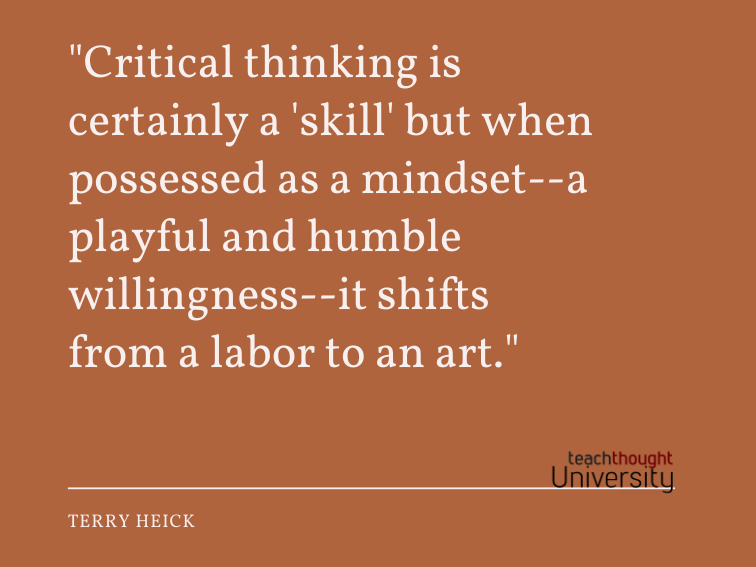

by Terry Heick
Every couple of months, I see a short article making the rounds that critical reasoning isn’t a skill and consequently can’t be taught.
And since it’s additionally hard to determine and modern-day public education is driven by dimension, as an idea it sort of sits in the edge, withdrawn and mute.
Usually, these articles are in regards to a discussion or study related to Daniel Willingham, a psychologist at the University of Virginia that is typically related to this sort of case. Despite the fact that my impulse is to differ, Willingham, of course, understands much more about this topic than I do so my goal right here is not to disagreement that claim.
I do, nevertheless, think it’s possible that we may misunderstand what it implies to assume critically, which I’ve blogged about (though not often or well adequate) often times. In The Interpretation Of Important Believing , as an example, I claimed:
Essential thinking is among the very first causes for adjustment (individual and social) however is a pariah in colleges– for no other factor than it conditions the mind to presume the type and feature of whatever it sees, including your classroom and whatever being shown in it. Of course, essential thinking without understanding is embarrassingly still, like a farmer without an area. They need each various other– idea and understanding. They can also disappear right into each other as they function. As soon as we’ve developed that– that they’re different, capable of merging, and need each other– we can get at the marrow and worry of this entire point.
Terry Heick
After watching the effect of disinformation on recent national and global occasions, it has actually occurred to me that essential thinking is much less of a skill and even more of a desire or routine. In other words, important thinking is a state of mind. As I have actually said before regarding analysis– here, as an example, in Why Students Ought To Read — is that while it is essential that trainees can read, it’s more crucial that they do read.
And essential thinking– thinking reasonably, with reason and evidence, humility and expertise, understanding and apprehension– is comparable: it is very important that students can think seriously but it’s more crucial that they do assume critically.
In this way, vital reasoning has to be a way of thinking.
Important Believing Is A State Of Mind
Arstechnica (somewhat) recently covered just how set state of minds harm believing in talking about Why Can Only 24 % Address Bayesian Thinking Troubles in Natural Regularities: Regularity Phobia even with Likelihood Blindness
Equally as mathematics can be claimed to be a kind of language and science is a point of view, essential thinking (while likewise being a ‘method’ of thinking) is first a state of mind– a readiness to do so both came before and proceeded by a motley collection of presuppositions and properties and tendencies and cognitive defaults and even ultimately personality traits that show up when you read a publication or have a conversation or skim a news heading or research an idea.
Important thinking is certainly a ‘skill’ yet when possessed as an attitude– a spirited and humble determination– it shifts from a labor to an art. It asks, ‘Is this real? By what standard? That would certainly differ and why? What is the history of this problem or subject? What am I missing out on? What type of understanding am I missing to understand this a lot more carefully and just how can I get them?
Essential reasoning as a skill attempts to understand.
Important reasoning as a way of thinking checks out and listens as a witness and is haunted by what it doesn’t know and can not understand and after that, from that starting factor, starts the procedure of factor– of being and becoming sensible
Critical reasoning isn’t psychological since its identification isn’t involved a point of view or ‘belief’ and being ‘incorrect’ is beneficial because it gets us closer to being ‘right.’
Important thinking is virtually difficult to use without some type of bias however, as a mindset, it expects its own predispositions (see the definition verification bias , for instance) as a watchman might look for unfamiliar people.
Important thinking is sluggish to decide and might not ‘decide’ in all since it realizes that in the face of brand-new evidence, it has to reconsider. And again. And again.
And, as a mindset, it’s all right with the labor of it all because it values reason greater than favor with crowds; it prefers accuracy over viewed accuracy and experiences any kind of condition dewy-eyed and modest and interested, looking for to recognize and frightened to death of prejudice and insufficient expertise and sensible misconceptions and various other cognitive misdeeds that may lead it astray.
See? Vital thinking is an ability but it’s additionally a tendency and attribute and light-making device in darkness for many ends up being an attitude– both a way of knowing and a method of being.
And this is all part of method teaching it as a skill– just like show trainees just how to review instead of why– becomes part of our difficulty in education and learning. As usual, we are asking the incorrect inquiries.
Important Thinking Is A Mindset